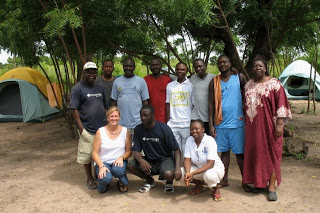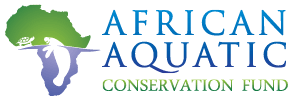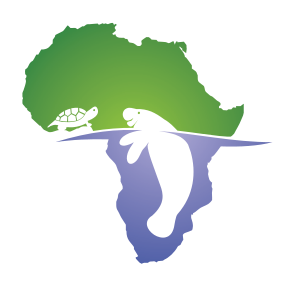Manatee Conservation Workshop at Lake Volta, Ghana
I’ve just spent the past two weeks co-teaching an African manatee conservation training course run by Earthwatch and the Nature Conservation Research Center (NCRC) of Ghana. My friend and colleague Dr. Patrick Ofori-Dansen is the Principal Investigator for a manatee research project on Lake Volta, and I assisted him in teaching the course. Unlike Earthwatch projects where participants pay to accompany researchers and assist with their studies, this capacity building program funds African researchers to come to the workshop to learn skills they can use in their home countries. Eight participants were selected for this year’s training. They came from Nigeria (2), Liberia (2), Ghana, Gabon, Senegal and Togo, and included two women and six men. Their professional experience ranged from university student to senior researchers who have worked in field biology for many years, but mostly with other species. We had several reptile researchers and a bird enthusiast in the group. Some have done manatee work in their countries already; others were there to find out how to begin.
On the first morning we left Accra, the capital of Ghana, and drove 4 hours north to Lake Volta. We took a short ferry ride across the lake and arrived at a camp set up near the village of Samamkwaii. We were on the Afram Arm of Lake Volta, and the surrounding area of open scrubland is known as the Afram Plains (it was formerly forest, but the trees were mostly cut long ago and the area is now farmland). The camp includes a dining / classroom hut, a kitchen and bathing and bathroom huts. We slept in tents and meals were prepared by people from the nearby village who are employed at the camp. The weather was very hot and humid with rain nearly every afternoon (which mercifully cooled things off a bit).
On the map of Ghana below I’ve put a red box around the Afram Arm of Lake Volta and a red X on the approximate location of our camp.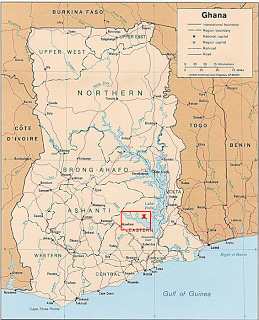 The ferry we took across the Afram Arm of Lake Volta
The ferry we took across the Afram Arm of Lake Volta 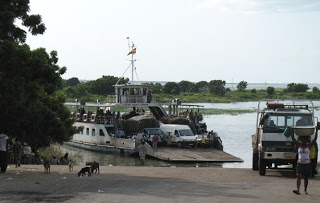 View of Lake Volta from the ferry
View of Lake Volta from the ferry
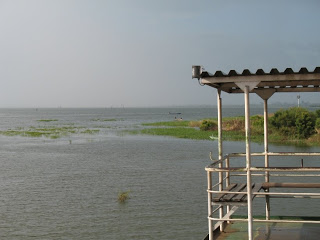 Camp
Camp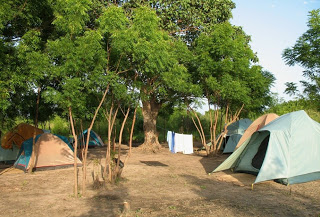 The dining / classroom hut
The dining / classroom hut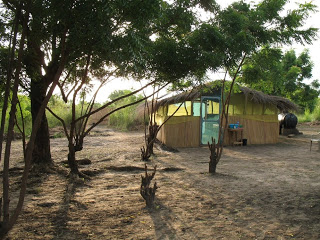 Typical house in the nearby village of Samamkwaii
Typical house in the nearby village of Samamkwaii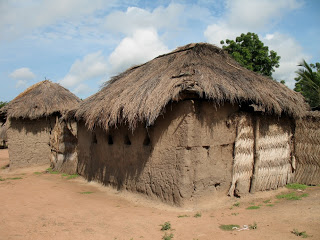 Grain storage building
Grain storage building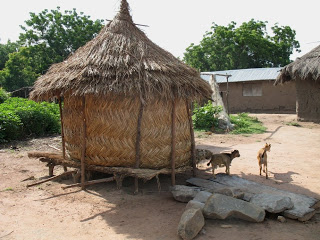 Over two weeks I gave lectures on manatee evolution, field research techniques, genetics sampling, and my research in Gabon and Angola. I had lots of time to talk with participants individually to discuss ways to address research needs and techniques for each person’s home country, so that they can tailor their research to their individual situations. Patrick and his teaching assistant Emmanuel taught a skull morphology workshop, gave lectures on research in Ghana and an introduction to environmental sampling equipment such turbidity and dissolved oxygen meters, GPS, etc. They took the participants out on Lake Volta for habitat and manatee scanning surveys, and to learn environmental sampling techniques.
Over two weeks I gave lectures on manatee evolution, field research techniques, genetics sampling, and my research in Gabon and Angola. I had lots of time to talk with participants individually to discuss ways to address research needs and techniques for each person’s home country, so that they can tailor their research to their individual situations. Patrick and his teaching assistant Emmanuel taught a skull morphology workshop, gave lectures on research in Ghana and an introduction to environmental sampling equipment such turbidity and dissolved oxygen meters, GPS, etc. They took the participants out on Lake Volta for habitat and manatee scanning surveys, and to learn environmental sampling techniques.
The skull morphology workshop
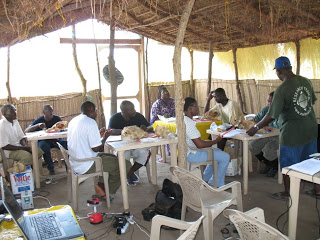 Early morning boat trip to look at habitat and for manatees.
Early morning boat trip to look at habitat and for manatees. 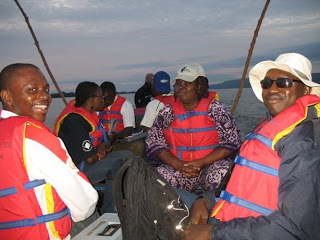 I also went out on several boat trips when I wasn’t giving lectures. It’s an interesting place- the lake was created in the late 1960’s when the Volta River was dammed and flooded several large forested valleys. Trunks of dead trees still protrude above the water’s surface in many areas. A population of manatees was trapped above the dam and is now isolated here. It is unknown how many manatees are here, but they are hunted, their conservation is of great concern and the lake is also subjected to intense fishing pressure. During one of the morning boat trips some of the students sighted a manatee, which is exciting for here, where they are rarely seen alive.
I also went out on several boat trips when I wasn’t giving lectures. It’s an interesting place- the lake was created in the late 1960’s when the Volta River was dammed and flooded several large forested valleys. Trunks of dead trees still protrude above the water’s surface in many areas. A population of manatees was trapped above the dam and is now isolated here. It is unknown how many manatees are here, but they are hunted, their conservation is of great concern and the lake is also subjected to intense fishing pressure. During one of the morning boat trips some of the students sighted a manatee, which is exciting for here, where they are rarely seen alive.
Several nice views of Lake Volta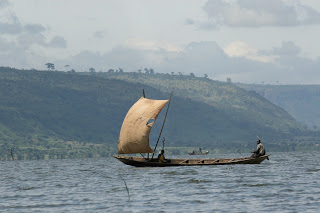
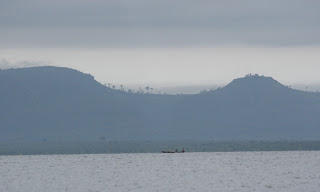 Other than that, it’s hard to sum up two intense weeks of learning, laughing and good conversations in a few short paragraphs. Everyone in the group got along really well and we talked about our lives, politics, war, religion, the difficulties and frustrations of working in wildlife conservation in Africa… and endlessly about every aspect of manatees. Each evening someone gave a “personal profile” and some the stories of people’s lives were incredible. One person had been a refugee at one point in his life and later studied at Columbia University in the USA; another had done every job imaginable from taxi driver to singer to earn money to go to school- now he’s a PhD lecturer teaching at a Nigerian university. Several had lived through terrible wars in their countries. One guy has been able to get a wildlife refuge created in his country (Senegal) for manatee and turtle protection and others are just starting out, but everyone is extremely motivated to make real contributions to manatee conservation. It is inspirational to see such excitement and focus, and I believe that manatee research in the region will surely benefit from the efforts of these wonderful people who I now consider good friends as well as colleagues.
Other than that, it’s hard to sum up two intense weeks of learning, laughing and good conversations in a few short paragraphs. Everyone in the group got along really well and we talked about our lives, politics, war, religion, the difficulties and frustrations of working in wildlife conservation in Africa… and endlessly about every aspect of manatees. Each evening someone gave a “personal profile” and some the stories of people’s lives were incredible. One person had been a refugee at one point in his life and later studied at Columbia University in the USA; another had done every job imaginable from taxi driver to singer to earn money to go to school- now he’s a PhD lecturer teaching at a Nigerian university. Several had lived through terrible wars in their countries. One guy has been able to get a wildlife refuge created in his country (Senegal) for manatee and turtle protection and others are just starting out, but everyone is extremely motivated to make real contributions to manatee conservation. It is inspirational to see such excitement and focus, and I believe that manatee research in the region will surely benefit from the efforts of these wonderful people who I now consider good friends as well as colleagues.
Dr. Patrick, who everyone calls “Prof”, has been working with the manatees of Lake Volta since 1998. I first met him when he came to Florida for manatee training in 2000 and it was great to finally see his country. (Photo by Tomas Diange)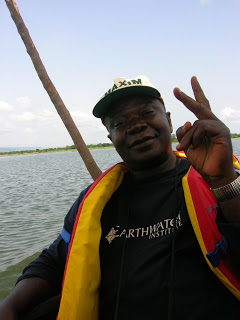 Martin works for NCRC and was our trip logistics coordinator… he did a fantastic job keeping us organized!
Martin works for NCRC and was our trip logistics coordinator… he did a fantastic job keeping us organized!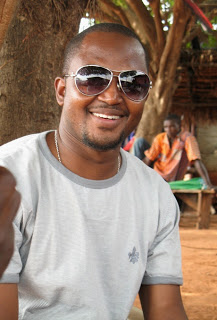 Tomas getting in touch with his manatee side. He was nicknamed senegalensis (the species name for West African manatee) since he’s from Senegal. This led to humorous nicknames for everyone based on their country… Liberiensis, Nigeriensis, Americanensis, Gabonica, etc.
Tomas getting in touch with his manatee side. He was nicknamed senegalensis (the species name for West African manatee) since he’s from Senegal. This led to humorous nicknames for everyone based on their country… Liberiensis, Nigeriensis, Americanensis, Gabonica, etc.
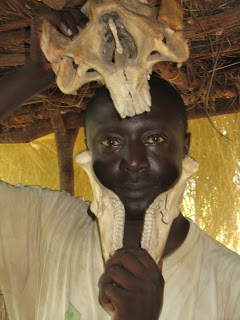 Bolaji and Edem from Nigeria added constant theatrics and humor to the group. This photo was taken on an afternoon off when we went to a local bar in town to relax.
Bolaji and Edem from Nigeria added constant theatrics and humor to the group. This photo was taken on an afternoon off when we went to a local bar in town to relax.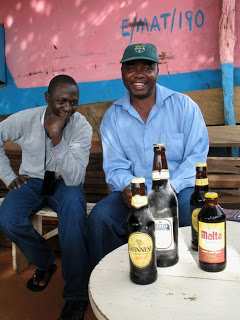 Alex (top) and James (photo below) from Liberia will start trying to find manatees in their country when they return home.
Alex (top) and James (photo below) from Liberia will start trying to find manatees in their country when they return home.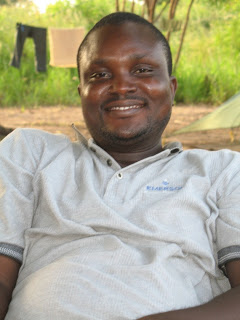
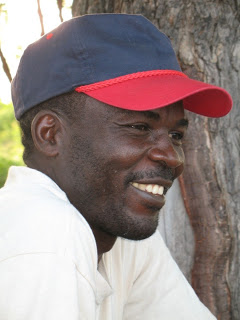 Gabriel from Togo has just finished his PhD on reptiles, but has also been working on manatees in Lake Togo for the past several years
Gabriel from Togo has just finished his PhD on reptiles, but has also been working on manatees in Lake Togo for the past several years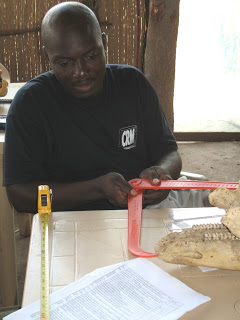 Tomas, Solange and Gabriel were the three Francophones in our group. Every morning we woke to Gabriel and Solange’s infectious laughter as Tomas told them jokes in French. Most of our conversations were a melange of “Franglais” so that everyone could understand.
Tomas, Solange and Gabriel were the three Francophones in our group. Every morning we woke to Gabriel and Solange’s infectious laughter as Tomas told them jokes in French. Most of our conversations were a melange of “Franglais” so that everyone could understand.
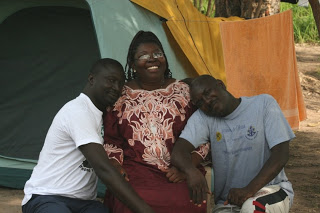
Theresa is a student at the University of Ghana who plans to work with manatees in the future and Emmanuel was the course teaching assistant. (Photo by Tomas Diange)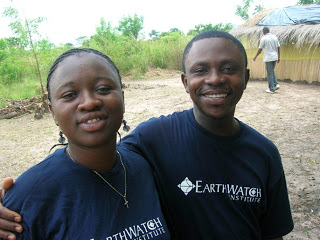 The whole group (except Edem who was out looking for snakes!) I miss you all already!
The whole group (except Edem who was out looking for snakes!) I miss you all already!